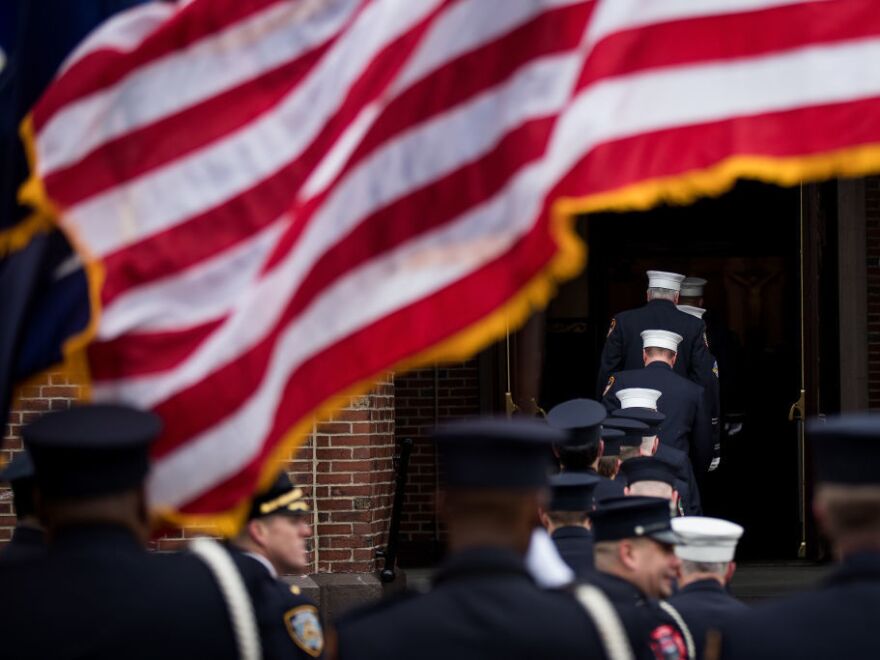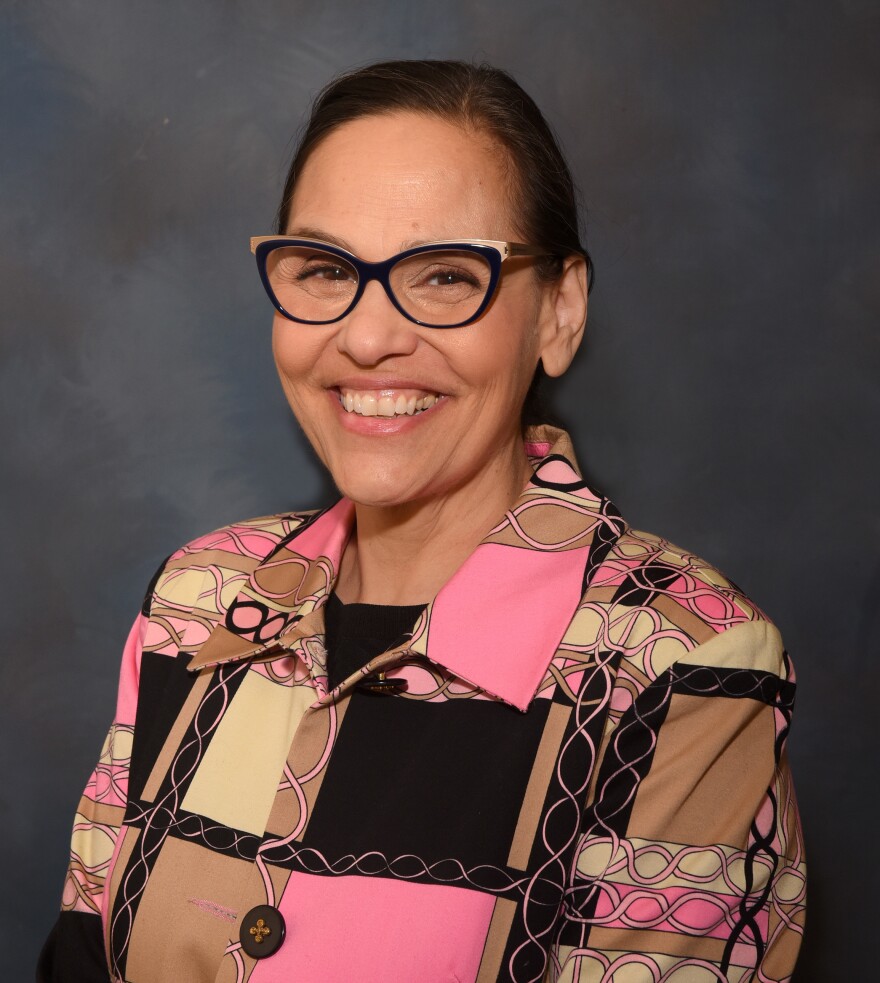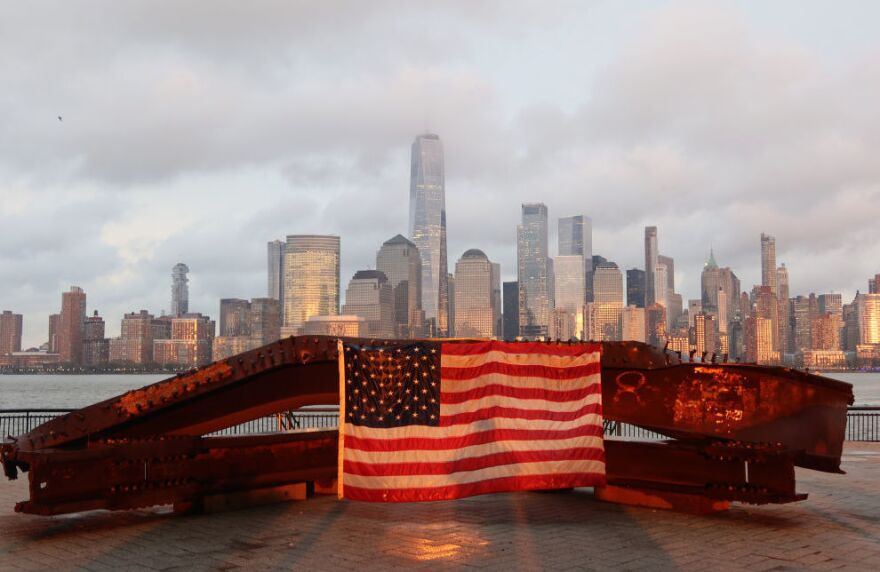Updated September 8, 2021 at 2:33 PM ET
On the morning of September 11, 2001, Elizabeth Cascio, an emergency medical technician with the New York City Fire Department, was in Queens directing a first responder training program, when the team got a call to mobilize to the World Trade Center. Her team arrived in a caravan of buses and ambulances just as the second tower collapsed.
At first it was "pitch black," Cascio recalls. "We couldn't see anything." A dust cloud swirled around them. "We were literally engulfed by it."
She recalls trying to hold her breath to avoid breathing in the fumes and dust. "We were walking through six to 10 inches of, like, concrete sand."
Cascio spent about a month at ground zero assisting the recovery efforts, and she was among the first responders who developed a cough. Then, in 2019, she received a cancer diagnosis that her doctors determined was linked to her exposure.
"The exposure [among first responders] was really dramatic," explains Dr. Michael Crane, a physician and environmental medicine professor at the Icahn School of Medicine at Mount Sinai, who also is the medical director of a clinic that delivers care to 9/11 first responders. "There were all kinds of carcinogens and combustion products," Crane says.
The contents of two skyscrapers including concrete, pipes, computers, were pulverized into burning ash laden with lead and other heavy metals. The plume of smoke that could be seen from space. "It was a real witch's brew," Crane says.
Increased cancer risks
It can take years, even decades, for cancers to develop. A study published in 2019 found that 9/11 first responders have an elevated risk of certain cancers, including a roughly 25% increased risk of prostate cancer, a doubling in the risk of thyroid cancer and a 41% increase in leukemia compared to the general population.
"When you hear the word cancer, it's a sobering moment, a scary moment," says Cascio, who is now chief of staff at FDNY. She says that 257 active and retired FDNY members have died of 9/11-related illnesses, including cancer.

But recent research has found that first responders are also more likely than the general population to survive their cancers, according to the results of a study published this summer in the American Journal of Industrial Medicine. Researchers compared cancer deaths among the first responders to cancer deaths in the population in the New York area.
"We found they were about 35% more likely to survive than the general population," explains Rachel Zeig-Owens, an epidemiologist at the Albert Einstein College of Medicine, and one of the authors of the study.
And the extent of the benefit is something the authors did not anticipate. "I was surprised by the magnitude of the benefit, says biostatician Charles Hall, a co-author of the paper.
Cascio got diagnosed with a rare, invasive cervical cancer that spread quickly. It has been determined that exposure to 9/11 could be a contributing factor for this type of cancer, along with multiple other rare cancers.
Her doctors came up with an aggressive treatment plan that included chemotherapy and radiation. She says the side effects of the treatment were really rough, she felt very sick and exhausted. But she responded well.
Midway through the treatment the results of a CAT scan buoyed her spirits. "The tumor had shrunk dramatically, very quickly," Cascio recalls. "I did feel relieved." She is now healthy and working full time at FDNY.

'Paid-for care is better care'
There are multiple factors that might explain the increased likelihood of cancer survival among 9/11 first responders.
For one thing, "it may be that they were healthier to begin with," says Zeig-Owens. The first responders were, on average, in their late 30s on the day of the September 11 attacks. And their jobs as firefighters and EMTS require a higher level of physical fitness, compared to people with sedentary jobs, she points out.
"The 'healthy worker' effect is real," agrees Mt. Sinai's Crane. But, another possibility is that the first responders are benefiting from the comprehensive screening and medical care offered through the World Trade Center Health Program.
Elizabeth Cascio is among approximately 80,000 people who are part of the federally-funded WTC Health Program, which provides monitoring and treatments for health conditions that are certified to be related to the September 11th attacks.
Crane, who is the medical director of the program, explains all of the medical care, including the treatments, are paid for by the program. "It may be indeed that paid-for care means better health care and better results and decrease in mortality," Crane says.
An important benefit of this "better health care" is that some cancers are found earlier.
"We also were noticing that they were diagnosed at earlier stages," Zeig-Owens says, which may lead to earlier treatment and might play a role in the improved survivability.
Cascio says she was very well cared for during her treatments. Being part of the WTC Health Program and part of the New York City Fire Department, she says there's a tremendous support network. For instance, she was offered transportation to and from her appointments. "You're not worried about, how do I pay for this? You're not worried about, how do I get to and from [my medical appointments]. So there's a lot of stressors that don't exist for us," she says.
The big unknown is whether 9/11 first responders will continue to beat the odds and survive their cancers at significantly higher rates. Crane says the rescue and recovery workers who were present on 9/11 are, on average, in their late 50's, and the "healthy worker" effect that has worked to their advantage may begin to dissipate as they hit retirement age.
But it's also possible that the comprehensive screening and treatment will continue to pay off.
"I think this is very exciting," Crane says. He hopes researchers continue to track the incidence of cancer among first responders, so the long-term impacts of early screening and comprehensive care can be documented. "This will really help answer a lot of questions," he says.
Cancer is always a hard diagnosis. But the evidence that there's an improved chance of survival among first responders is encouraging. "There is a lot of community rallying behind them," explains Zeig-Owens, and this may be an important part of the care.
"It is really nice to show that while they are being diagnosed with cancer at higher rates than the general population, they're able to survive those cancers," Zeig-Owens says. "That is a good feeling."
Copyright 2023 NPR. To see more, visit https://www.npr.org.






